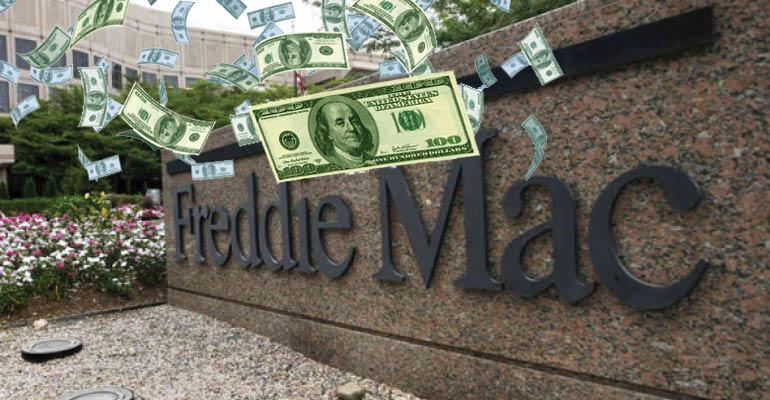(Bloomberg)—Freddie Mac said it earned enough in the second quarter to send a $2 billion dividend to the U.S. Treasury, but the press release announcing the company’s financial results includes new language suggesting uncertainty as to whether the payment will be made as scheduled.
The mortgage-finance company on Tuesday reported net income of $1.66 billion for the period that ended June 30, up from $993 million in the same period a year earlier. Net interest income, including earnings from guaranteeing mortgages, stayed steady at $3.38 billion, Freddie said.
In its press release announcing the earnings, the company significantly changed the language used to describe the dividend payment, which Freddie and Fannie Mae make under terms of bailout agreements with the federal government. The new release said the payment will be made “If the Conservator declares a senior preferred stock dividend,” and also described how accrued and unpaid dividends are treated.
The changes came a few months after Federal Housing Finance Agency Director Mel Watt told Congress that he was considering letting Freddie and Fannie retain some earnings to protect against the need for more taxpayer funds. The companies have been under FHFA control since they were seized by regulators in 2008. They have $258 billion in bailout money remaining if needed to cover losses, and Watt expressed concern that a reduction in that amount could spook mortgage bond investors and disrupt the market.
‘Technically Accurate’
On a call with reporters, Freddie Mac Chief Executive Officer Donald Layton said the company often changes language in its earnings release and that the change was made to make it “more technically accurate.” On a separate call, Layton said that part of the reason for focusing on this particular language was that “the topic is so generally in the air.”
Layton said that the FHFA generally sends a letter directing Freddie to pay the dividend about a week before it is due, in this case at the end of September. He said he hadn’t received an indication of a change this quarter.
“The Director has not made any decisions,” FHFA spokeswoman Megan Moore said in an email, referring to Watt. “The concerns he raised last year and earlier this year remain.”
If Freddie makes its dividend payment as scheduled, it would have paid about $110 billion to the Treasury since 2008, versus the $71 billion in bailout money it received.
Unlike in prior quarters, Freddie’s income wasn’t buffeted significantly by changes in interest rates. Changes in rates took away about $100 million in earnings, and Layton said the lessened impact was mostly due to a change in the way the company accounts for derivatives it uses to hedge its portfolio.
Freddie said the percentage of loans on which borrowers were 90 days or more past due was 0.85 percent, down 0.23 percentage point from a year ago and the lowest point since early 2008.
To contact the reporter on this story: Joe Light in Washington at [email protected] To contact the editors responsible for this story: Gregory Mott at [email protected] Larry Liebert
COPYRIGHT
© 2017 Bloomberg L.P

